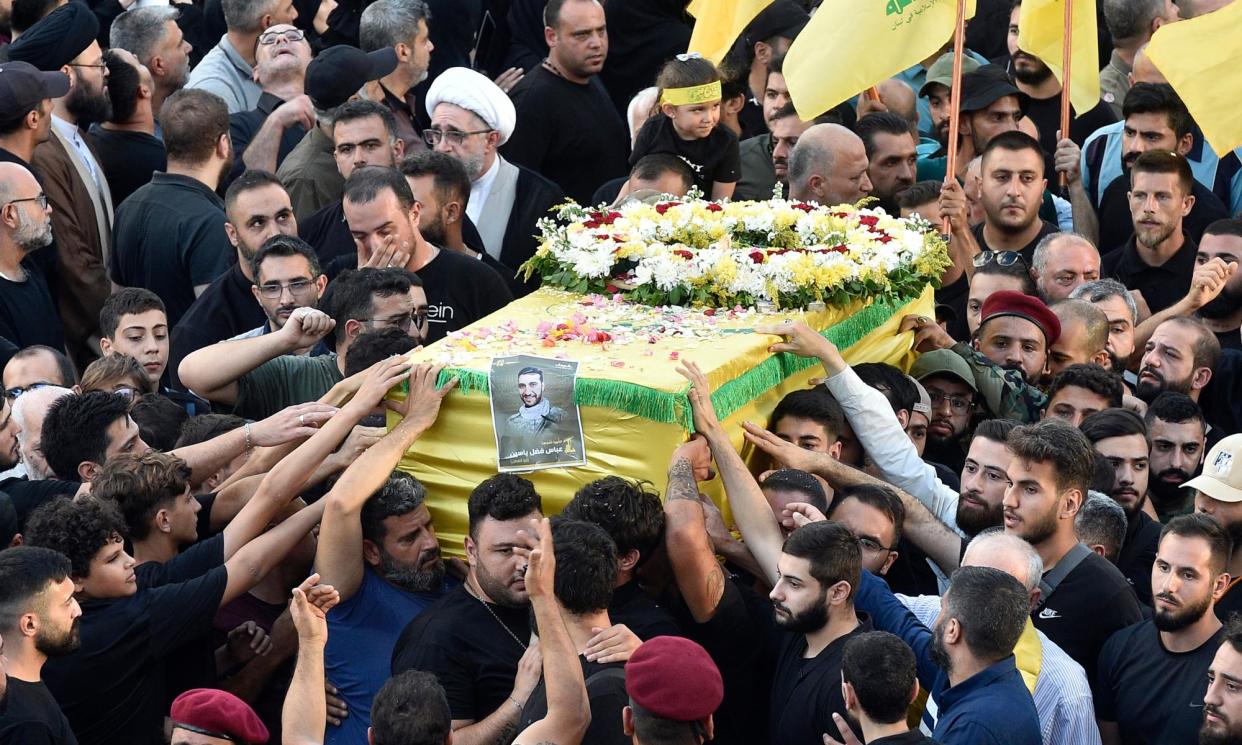Israel’s double-punch humiliation of Hezbollah is a dance on the edge of an abyss

The detonation of walkie-talkies around Lebanon a day after scores of pagers used by Hezbollah officials blew up is a one-two punch that drives home the extent of Israel’s penetration of its Shia foe’s defences across its northern border.
It represents utter humiliation for Hezbollah that its security can be so effortlessly breached twice, and be shown incapable of protecting its own people.
Israel has not admitted responsibility for the blasts but there is little doubt around the region that this was an operation bearing the Mossad’s hallmarks. The more difficult questions concern its purpose: do these attacks represent tactical surprise for its own sake, or are they part of a broader strategy, and where does that strategy lead? Is this a prelude to an all-out war in Lebanon, or a substitute for one?
The miniature bombs have gone off in Lebanon at a time of increasingly bellicose language from Netanyahu’s coalition. At a late-night meeting on Tuesday, the security cabinet agreed to broaden the country’s stated war aims from Gaza to the north, to include the goal of enabling the return of over 60,000 Israelis displaced by cross-border exchanges with Hezbollah since the conflict erupted on 7 October.
The security logic in Israel is that those people cannot go home to their northern towns and villages while Hezbollah is still entrenched in southern Lebanon, between the border and the Litani river.
The hope of the Biden administration and other brokers in the region is that a negotiated ceasefire in Gaza would also defuse tensions on the Israel-Lebanon border, allowing displaced Israelis to return without further escalation. No such ceasefire has materialised, however, while the talk of a new Israeli war in Lebanon has gathered momentum. Netanyahu’s office has reportedly been briefing in recent days that one of the reasons the prime minister is considering dumping the defence minister, Yoav Gallant, is that Gallant’s enthusiasm for a war in Lebanon has dimmed.
As always with Netanyahu, it is hard to tell how much of this whispered campaign is really about military intentions, and how much is about domestic politics and the prime minister’s constant need to tend to his coalition to keep him in power. He is talking to Gallant’s would-be replacement, Gideon Sa’ar, the leader of the New Hope party, whose members could help stabilise the coalition’s standing.
While there are manoeuvres in the corridors of the Knesset, there are few signs of corresponding offensive deployments on the Lebanese border. Israel Defense Forces (IDF) units continue to be rotated out of Gaza to go north, but they are exhausted and in insufficient numbers to launch a ground attack.
Israel could greatly intensify its aerial campaign in Lebanon, but few if any military observers believe that the threat represented by Hezbollah and its formidable arsenal of missiles and rockets can be blunted from the air alone. And a ground offensive on Hezbollah’s home turf in southern Lebanon would be costly in terms of Israeli casualties and therefore politically risky.
The detonating devices in Lebanon offer Netanyahu the benefits of a spectacular, daring success, showing he is taking the battle to the enemy in the north, in the knowledge that Hezbollah, and its Iranian backers, have looked anxious to avoid being drawn into a full-scale war with Israel. The Hezbollah leader, Hassan Nasrallah, sought to mislead his followers by exaggerating the success of a mass rocket and drone attack last month against strategic targets like Israeli intelligence headquarters, to lessen internal political pressure to inflict greater damage on Israel.
Nasrallah is now under even more pressure to deliver a spectacular success of his own. The Israeli security agency, Shin Bet, claimed this week to have foiled a Hezbollah plot to assassinate a former senior member of the country’s security establishment. If such a plot had succeeded, the demands within Israel for the IDF to deal with the Hezbollah threat “once and for all” would have grown significantly.
It is an inherently unstable situation. Hezbollah needs to maintain its credibility as the tip of the spear of Islamic resistance to Israel. Netanyahu needs to keep Israel in a continual state of war to put off the threat of elections, and with them his risk of a fall from office with corruption charges pending in the courts. Both seek to stay on the brink of a wider war, without the power necessarily to stop events taking on a momentum of their own and taking the region over the edge.


